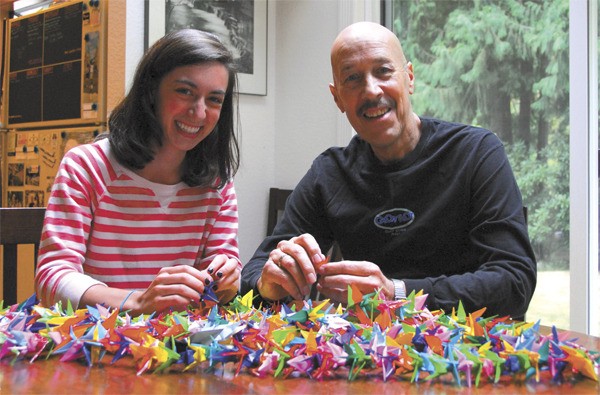After his brain tumor was removed, Al Clarke of North Bend lost a few things. His peripheral vision in his left eye was diminished, and the taste for onions and garlic that he shared with his wife and two daughters was just gone.
“When he did the chemo, everything tasted bad,” said Jenn Clarke, Al’s oldest daughter, and the spokesperson for this year’s Brain Cancer Walk in Seattle. When he finished his treatment, Al could enjoy food again, except for the onions and garlic. “Now he doesn’t like them,” Jenn said.
It was a small loss compared with the success of the treatment. He is four years past his initial diagnosis of Stage IV brain cancer, three years past treatment, with almost no loss of brain function, and he sees an oncologist only twice a year.
“When he goes to his brain doctor, they say, ‘you look good,’” Jenn said, “and there’s not that many brain cancer survivors out there who get that ‘you look good.’ They’re just lucky to have continued three years with their chemo and radiation and still be alive.”
Al had a lot working in his favor when he was first diagnosed, though. A stay-at-home father since Jenn’s birth, he worked out regularly and was fairly health despite a smoking habit. He also had the whole-hearted support of his wife and daughters, who sported “Frankenstein is my friend” T-shirts after his brain surgery, and his extended family. Jenn took a week off school to spend time with her dad, and her mother took a leave of absence from her job at Boeing to help with his recovery. Since starting college, Jenn has decided to live at home, too.
She says she’s mainly at home to make sure he eats regularly, but adds “I just wanted to see him more. It’s hard to make that feeling of uncertainty go away … there’s something really comforting about seeing him and saying good morning every day.”
Al had a setback earlier this year, when he developed bladder cancer and tumors in his prostate. He had surgery to remove those in June and is now cancer-free for the first time in three years.
Jenn has done lots of reading and research on brain cancer and its treatment since her father’s diagnosis, and she knows that her dad has beaten the odds.
“I just think about how lucky we are, and I’m so sad when people aren’t that lucky,” she said.
Her father’s illness is how she became involved in the Seattle Brain Cancer Walk three years ago, but her compassion for other brain cancer patients is what keeps her involved. She and her family hope to raise more than $1,000 in donations in the fourth annual walk in Seattle on Saturday, Sept. 24.
In addition to walking with her team, “Al’s Pals,” she has helped plan parts of the event, and is currently stringing together thousands of paper cranes for the Tent of Honor, where patients and families share their stories of love and loss. She is also the spokesperson again for the second year in a row, talking about her own family’s experience to highlight the cause.
“Looking at my dad, he seems OK to us, and it’s hard to remember that the research is underfunded and there are only three or four medicines available,” Jenn said.
Besides raising funds, the walk is intended to show other brain cancer patients and their families that there is a supportive community of people going through the same or similar challenges. Jenn saw that in the first year of the walk, and it has inspired her. Not only does she say “I couldn’t not do the walk any more,” she plans to pursue some type of fund raising work when she finishes school with her environmental studies degree.
“I don’t know how I could ever do something that wasn’t helping other people,” she says. “I just want an answer to be out there.”
The fourth annual Seattle Brain Cancer Walk starts at 9 a.m. Saturday, Sept. 24, at the Seattle Center fountain. To see a map of the course, donate, or register a team, visit www.braincancerwalk.org. This year’s fundraising goal is $400,000 with a target of 2,500 teams participating.



